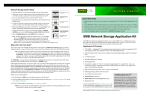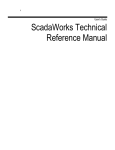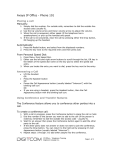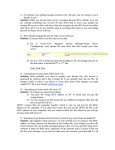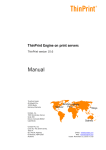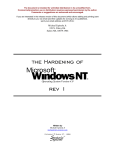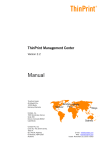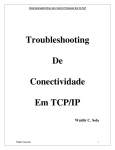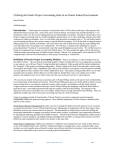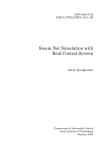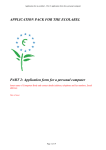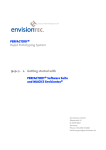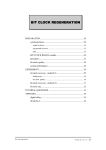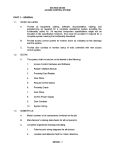Download embeo ThinShare SMB Client Suite
Transcript
ThinShare SMB Client Suite Manual v1.50 15 May 2008 Embeo, Inc. ThinShare: SMB Client Suite Manual Embeo, Inc. Published 05/15/2008 Copyright © 2005, 2006, 2007, 2008 Embeo, Inc. Table of Contents I. Getting Started ................................................................................................................ 1 1. Introduction to SMB ............................................................................................... 3 2. Installing ThinShare ................................................................................................ 4 3. Sample Programs .................................................................................................... 5 3.1. Introduction ................................................................................................. 5 3.2. Windows/Linux PC Server Configuration ......................................................... 5 3.2.1. Windows Server Setup ........................................................................ 5 3.2.2. Windows 2003 Server Settings ............................................................. 7 3.2.3. Linux Samba Setup ............................................................................ 8 3.2.4. Troubleshooting ................................................................................. 9 3.3. Samples Synopsis ......................................................................................... 9 3.3.1. hello_world_txt.c - "Hello World.txt" .......................................... 9 3.3.2. smbshell.c - "ThinShell" ................................................................ 9 3.3.3. cat.c - "View File" ......................................................................... 9 3.3.4. cp.c - "Copy File" .......................................................................... 10 3.3.5. comprehensive.c - "Comprehensive File I/O" .................................. 10 3.3.6. network_smb_dump.c - "Server/Share Information Dump and Printout" ........................................................................................................ 10 4. Getting Support .................................................................................................... 11 4.1. What to Provide When Contacting Support ...................................................... 11 4.2. Email Support ............................................................................................ 11 5. License Agreement ................................................................................................ 12 II. Technical Reference ...................................................................................................... 13 6. Basic Configuration and Startup ............................................................................... 15 6.1. SMB Options ............................................................................................. 15 6.1.1. Host/Group Name ............................................................................ 15 6.1.2. Enabling the Browse Service .............................................................. 15 6.2. System Startup ........................................................................................... 16 7. SMB Sessions ...................................................................................................... 17 8. File Operations ..................................................................................................... 18 8.1. Opening and Closing Files ........................................................................... 18 8.2. Reading And Writing to Files ....................................................................... 18 8.3. Miscellaneous File Operations ....................................................................... 18 9. Filesystem Directory Operations .............................................................................. 20 9.1. Creating and Deleting Directories .................................................................. 20 9.2. Searching Directories ................................................................................... 20 10. Browse Service ................................................................................................... 21 10.1. Network and Server Operations ................................................................... 21 10.2. Printer Support ......................................................................................... 21 11. Advanced System Configuration ............................................................................. 23 11.1. NetBIOS Options ...................................................................................... 23 11.1.1. Node Type .................................................................................... 23 11.1.2. WINS Server ................................................................................. 23 11.1.3. DHCP Support (Dynamic C 8.30 and Later) ........................................ 23 11.2. SMB Configuration File and Macros ............................................................ 24 III. Function Reference ...................................................................................................... 25 smb_chmod ............................................................................................................. 26 smb_close ................................................................................................................ 28 smb_connect ............................................................................................................ 29 smb_convutime ......................................................................................................... 31 smb_creat ................................................................................................................ 32 iii ThinShare smb_datetime ........................................................................................................... smb_dir_info ............................................................................................................ smb_disconnect ........................................................................................................ smb_fchmod ............................................................................................................ smb_fstat ................................................................................................................. smb_get_comment .................................................................................................... smb_get_nodename ................................................................................................... smb_get_nodetype ..................................................................................................... smb_get_WINS ........................................................................................................ smb_get_wrkgrpname ................................................................................................ smb_init .................................................................................................................. smb_list_all_servers .................................................................................................. smb_list_servers ....................................................................................................... smb_list_servers_ex ................................................................................................... smb_list_servers_manual ............................................................................................ smb_list_shares ......................................................................................................... smb_list_shares_ex .................................................................................................... smb_lpt_close ........................................................................................................... smb_lpt_open ........................................................................................................... smb_lseek ................................................................................................................ smb_mkdir ............................................................................................................... smb_mkutime ........................................................................................................... smb_open ................................................................................................................ smb_perror .............................................................................................................. smb_ptime ............................................................................................................... smb_read ................................................................................................................. smb_rename ............................................................................................................. smb_resolve ............................................................................................................. smb_resolve_force .................................................................................................... smb_resolve_ip ......................................................................................................... smb_rmdir ............................................................................................................... smb_sclose .............................................................................................................. smb_server_info ....................................................................................................... smb_set_comment ..................................................................................................... smb_set_nodename .................................................................................................... smb_set_nodetype ..................................................................................................... smb_set_waitcallback ................................................................................................ smb_set_WINS ......................................................................................................... smb_set_wrkgrpname ................................................................................................ smb_share_info ......................................................................................................... smb_sopen ............................................................................................................... smb_sread ............................................................................................................... smb_stat .................................................................................................................. smb_stat_t ............................................................................................................... smb_strerr ............................................................................................................... smb_tick .................................................................................................................. smb_unlink .............................................................................................................. smb_utime ............................................................................................................... smb_write ................................................................................................................ Index .............................................................................................................................. iv 33 34 35 36 37 39 40 41 42 43 44 45 47 49 51 53 55 57 58 60 61 62 63 65 67 68 69 70 71 72 73 74 75 76 77 78 79 80 81 82 83 85 87 89 90 92 93 94 95 96 Part I. Getting Started Table of Contents 1. Introduction to SMB ....................................................................................................... 3 2. Installing ThinShare ........................................................................................................ 4 3. Sample Programs ............................................................................................................ 5 3.1. Introduction ......................................................................................................... 5 3.2. Windows/Linux PC Server Configuration ................................................................. 5 3.2.1. Windows Server Setup ................................................................................ 5 3.2.2. Windows 2003 Server Settings ..................................................................... 7 3.2.3. Linux Samba Setup .................................................................................... 8 3.2.4. Troubleshooting ......................................................................................... 9 3.3. Samples Synopsis ................................................................................................. 9 3.3.1. hello_world_txt.c - "Hello World.txt" .................................................. 9 3.3.2. smbshell.c - "ThinShell" ........................................................................ 9 3.3.3. cat.c - "View File" ................................................................................. 9 3.3.4. cp.c - "Copy File" .................................................................................. 10 3.3.5. comprehensive.c - "Comprehensive File I/O" ......................................... 10 3.3.6. network_smb_dump.c - "Server/Share Information Dump and Printout" ........ 10 4. Getting Support ............................................................................................................ 11 4.1. What to Provide When Contacting Support .............................................................. 11 4.2. Email Support .................................................................................................... 11 5. License Agreement ........................................................................................................ 12 2 Chapter 1. Introduction to SMB The SMB protocol, or Windows File Sharing as it is more commonly known, is the de facto standard for file and printer sharing in use today. An SMB server makes file and printer resources available over a computer network. Once set up, SMB client software can access these resources and use them according to their purpose. The most recent version has been a built-in component to all versions of Microsoft Windows since the release of Windows 95. There have also been many software suites written, the most popular being Samba [http://www.samba.org], to expand the compatibility to any UNIX-like operating system (including Linux and Mac OS X). As a result, SMB is ubiquitous-- operating throughout corporate and home networks. ThinShare is an SMB client implementation. ThinShare supports communications with Windows 9x/NT4 and later, either in workgroup or domain configurations. Likewise, it is compatible with all versions of Samba. It must be compiled with Rabbit Semiconductor's Dynamic C version 7.05 or later development system to any TCP/IP enabled Rabbit 2000/3000 system. Note that Dynamic C version 8.30 or later is required for using DHCP to acquire a WINS server IP address. If this is not needed, standard DHCP is still supported with the previous Dynamic C versions. ThinShare offers the following services to embedded applications: • • • • • Standard File Operations: create, open, close, read, write, seek, get/set attributes, rename Standard Directory Operations: create, delete, wildcard search with attribute filter Standard Print Services: open/write/close print spool files User Authentication: plain-text, encrypted LM session key, encrypted NT session key Server Operations: get browse server, list servers in workgroup/domain, list shares on server ThinShare also offers SMB Browse service functionality that enables machine icons to appear in Network Neighborhood/My Network Places of Windows Explorer. Embeo's ThinShare SMB Client Suite uses the NetBIOS transport to communicate with other machines on the network. The NetBIOS layer offers IPC services and host name resolution to applications such as SMB. The included NetBIOS layer includes support for all features required for proper SMB functionality. It is an RFC1001/1002 compliant client implementation of the NetBIOS standard. It offers many configuration options which are documented in Section 11.1, “NetBIOS Options”. 3 Chapter 2. Installing ThinShare 1. Insert the installation media and run the install file ersmbinst.exe. 2. Select components to install. Options are: • Documentation and Samples • Start Menu Shortcuts • Add entries in LIB.DIR • Integrate Install with Dynamic C 3. Select destination directory. 4. (If 'Add entries in LIB.DIR' is selected in Step 2. If not, LIB.DIR must be manually edited) The installer is capable of detecting installed versions of Dynamic C, and it can update your LIB.DIR for you. Just select the "Add entry in LIB.DIR" option, and click YES when prompted to use the version of Dynamic C listed. If you have more than one version of Dynamic C installed and do not see the version listed, click NO and the installer will ask if you would like to use the next version detected. When the installer runs out of options, clicking NO results in being prompted for a LIB.DIR to use. 5. Done! Open up a sample program and try connecting to a machine! Sample programs are located in the \Samples\ThinShare folder relative to the Dynamic C installation (or ThinShare\Samples if integrate with Dynamic C is not selected). Adding Entries to LIB.DIR The ThinShare SMB Client will not work unless the .lib files are added to your LIB.DIR file used by Dynamic C. Refer to the Dynamic C user manual and LIB.DIR (in your Dynamic C installation directory) for more details. If you would like to manually modify your LIB.DIR(s), simply deselect the option during installation and remember where you installed the library and add the following lines to the end of your LIB.DIR (fill in with the correct path): Integrate install with Dynamic C selected: C:\Program Files\DCRABBIT_10.21\Rabbit4000\Lib\ThinShare\des.lib C:\Program Files\DCRABBIT_10.21\Rabbit4000\Lib\ThinShare\md4.lib C:\Program Files\DCRABBIT_10.21\Rabbit4000\Lib\ThinShare\netbios.lib C:\Program Files\DCRABBIT_10.21\Rabbit4000\Lib\ThinShare\smb_config.lib C:\Program Files\DCRABBIT_10.21\Rabbit4000\Lib\ThinShare\smb.lib Integrate install with Dynamic C not selected: C:\Program Files\Embeo\ThinShare\des.lib C:\Program Files\Embeo\ThinShare\md4.lib C:\Program Files\Embeo\ThinShare\netbios.lib C:\Program Files\Embeo\ThinShare\smb_config.lib C:\Program Files\Embeo\ThinShare\smb.lib 4 Chapter 3. Sample Programs This section describes the configurations for both Windows and Linux that are needed to run the sample programs. The sample programs are described next. 3.1. Introduction The samples all require the use of an SMB share with read-write access. ThinShare uses encrypted passwords (LM or NTLM) to connect to the remote machine. Note: Some servers (Windows 2003 Server and above) may be set by default to reject this form of encrypted passwords and use high encryption only. (See Section 3.2.2, “Windows 2003 Server Settings” [7]) 3.2. Windows/Linux PC Server Configuration In order to use the samples you must have a server on the same network as the rabbit. The server must have a shared folder with an associated username and password that has access. 3.2.1. Windows Server Setup First the server's name must be determined. The name can be acquired from System Properties (right click My Computer -> Properties -> Network Identification) or by typing ipconfig /all in a command window. The name of the server in this case is 'alum'. 5 Sample Programs Note: The Full computer name may not be the same as the NetBIOS name. To get the NetBIOS name click the Change or Properties button in the Network Identification tab, and then click the More button. The name is listed under NetBIOS computer name. In explorer, navigate to the folder you wish to share out, right click and select Sharing. 6 Sample Programs Make a note of the Share name; this name along with the server's name is used to make an SMB connection. The share name in this case is 'Shared'. Make sure that the the username used to access the shared folder has read/write access to the share. It is a good idea to create a new user account on the server or domain controller in order to limit access to certain shares or files. 3.2.2. Windows 2003 Server Settings Default security settings in Windows 2003 require high encryption for SMB authentication. So by default, ThinShare clients will not be able to connect to shares on a Windows 2003 domain. In order to enable ThinShare clients to connect the following settings must be made: Domain Controller Security Settings -> Local Policies -> Security Options Digitally Sign communications (always) DISABLED 7 Sample Programs Digitally Sign communications (if client agrees) ENABLED Network Security LAN Manager authentication level MUST NOT be set to the following (i.e., LM or NTLM must be allowed): [X] Send NTLMv2 resonse only\refuse LM [X] Send NTLMv2 resonse only\refuse LM & NTLM These settings may take some time to take effect; run the command gpupdate to apply the settings immediately. Note: If you disable NTLM make sure you disable it in ThinShare by defining the proper macro: // To disable NTLM keys #define _SMB_AUTH_USE_NT 0 // To disable LM keys #define _SMB_AUTH_USE_LM 0 // To use both NTLM and LM keys (not necessary, defaults to 1) #define _SMB_AUTH_USE_NT 1 #define _SMB_AUTH_USE_LM 1 3.2.3. Linux Samba Setup Under Samba, the shared folders are managed via the smb.conf file. The smb.conf file is usually located in one of the following locations: /usr/local/samba/lib/smb.conf /usr/samba/lib/smb.conf /etc/samba/smb.conf /etc/smb.conf The following is a simple portion of an smb.conf file that can be used to create a share for the Rabbit to be used in the samples. This portion assumes that a user named rabbit exists on the Linux machine. [rabtest] comment = Rabbit Shared Folder path = /home/rabbit read only = no writable = yes public = no #force create mode = 0770 #force directory mode = 0770 valid users = rabbit, @users All files and directories created by the rabbit will have permissions set only for the rabbit. Other users only have read permissions. The two commented out lines (force create mode/force directory mode) cause files created on the share to have read/write permissions set for the rabbit user and members of the same group. If you cannot delete files created by the rabbit you most likely have a permission problem and these two lines can help alleviate this. Refer to your Linux documentation for further help locating, configuring, starting and stopping Samba. 8 Sample Programs 3.2.4. Troubleshooting If Thinshare cannot connect to a share on the server, try the following steps. Create a new user account on the server that is sharing out the files. This should remove potential issues with user password authentication against a Domain Controller and the local server will perform the password authentication. Ensure the LAN Manager authentication level is compatible with Thinshare. Ensure SMB Signing is disabled. In certain configurations, a Windows computer may be set by the domain controller or group policy to only use high encryption. Check the LAN Manager authentication level in group policy editor (Control Panel->Administrative Tools->Local Security Policy. Or, Start->Run 'gpedit.msc'): Security Settings->Local Policies->Security Options->Network Security: LAN Manager authentication Level Ensure that NT or NTLM keys are accepted and not set to 'Refuse'. Make sure either LM or NTLM responses are being sent. The default setting in 2000 and XP is "Send LM & NTLM responses" or "Send NTLM response only" depending on the service pack. Another setting that can impact connectivity is the following: Security Settings->Local Policies->Security Options->Microsoft network server: Digitally sign communications (always) This should be set to disabled. Note: Make sure to run the "gpupdate" command after changing these settings to immediately apply the security policy. 3.3. Samples Synopsis Several sample programs are included with ThinShare. The samples are located in the \Samples\ThinShare folder relative to the Dynamic C installation (or in ThinShare\Samples if the integrate with Dynamic C option was not selected during installation). 3.3.1. hello_world_txt.c - "Hello World.txt" "Hello World.txt" is the closest to a hello world program for SMB you can probably get. This sample creates a new file on the server's SMB share and writes "Hello World!" into it. Requirements: The user has create and write-access to the share. 3.3.2. smbshell.c - "ThinShell" ThinShell provides an interactive command-line shell with a large number of available commands. Many common commands are available and virtually every aspect of the ThinShare SMB Library is utilized. Requirements: Varies per command. 3.3.3. cat.c - "View File" cat is named after the UNIX program of the same name. It is like the UNIX cat, or the DOS program type. It simply prints out the contents of a text file to the screen, in this case the Dynamic C stdio window. 9 Sample Programs Requirements: The input file exists on the server and the user account has read-access to the file. 3.3.4. cp.c - "Copy File" cp is named after the UNIX program of the same name. It is like the UNIX cp or the DOS program copy. Two files are specified, the source and destination. The source file is copied into a new file named destination. Requirements: The source file exists on the server and the user account has read-write access to the share. 3.3.5. comprehensive.c - "Comprehensive File I/O" Comprehensive is a fairly comprehensive sample covering almost all of the filesystem based functions. This sample generates its own files and is thus self-sufficient. It starts by creating a directory and a file in that directory. The file is then the subject of the rest of the sample: it is written to, read from, renamed, etc. Requirements: The user account must have create and write-access to the share. 3.3.6. network_smb_dump.c - "Server/Share Information Dump and Printout" The Network SMB Dump sample generates a list of machines in the device's current workgroup. It then gets the list of shares on the server specified. This list can be written to the server as either a text file or as a file to be printed (a printer spool file). If the print option is attempted, the printer must support line-printer style print access (non-postscript printers such as many inkjet or dot-matrix printers work well). Requirements: The workgroup must have a master browser that is accessible, the user account must have access to list shares on the server, and the user account must have access to create a print spool file on the printer (if printing mode is enabled). 10 Chapter 4. Getting Support Standard technical support is over email. Other levels of support may be negotiated, to increase a support package contact <[email protected]>. 4.1. What to Provide When Contacting Support • • • • • • • Dynamic C Version Processor / Development board (i.e., Rabbit 3000, RCM3200) Version of ThinShare ThinShare Configuration (What type of Node?) Possibly send a copy of your smb_config.lib file Server Configuration Windows/Linux (include OS version, Samba version, etc) Network Configuration (WINS servers?) Provide a clear and detailed explanation of the problem experienced including what operations were executed. 4.2. Email Support Send the information listed above to: <[email protected]> [mailto:[email protected]]. We try to respond within 24-48 hours during regular business hours, Monday thru Friday. 11 Chapter 5. License Agreement By downloading, installing, copying, extracting, or otherwise accessing or using the EMBEO THINSHARE LIBRARY (the "SOFTWARE") you agree to all terms in this license agreement. If you do not agree to any or every part of this license agreement ("LICENSE") DO NOT INSTALL, USE, COPY, EXTRACT, OR ACCESS the SOFTWARE. Embeo, Inc. grants the licensee a nonexclusive, nontransferable license to use and copy the SOFTWARE for usage by the licensee and those licensed within the licensee's representative business. The SOFTWARE may not be redistributed, sold, loaned, rented, leased, or re-sold except as a compiled binary inclusion in another piece of hardware by way of compilation and linking. The licensee may not create derivative works based on the SOFTWARE. Embeo, Inc. disclaims all warranties, express or implied, that the software is fit for a particular purpose, accurate, or error-free. Embeo, Inc. does not guarantee any frequency of fixes, updates, or modifications to the SOFTWARE. Embeo, Inc. will provide THE SOFTWARE in a binary and/or encrypted format to the licensee. All copies of the software are to remain within the licensed company. The licensee may not directly or indirectly via a third party, decompile, reverse engineer, disassemble, or otherwise attempt to access the source code of the SOFTWARE. Nor may the licensee alter, modify, extract, derive, or reference, the source code in any way. The licensee agrees not to hold Embeo, Inc. liable for any problems, monetary losses, or damages encountered through use, misuse, non-use, or inability to use the SOFTWARE. Embeo, Inc. shall provide software updates to fix known bugs ("bugfixes"). These updates will occur on Embeo's schedule. This license does not guarantee any specific frequency of releases nor does it guarantee any discrete period between notification of a bug and the fix. Embeo, Inc. shall provide technical support to the licensee, and only the licensee, via email and not to the licensee's customers or clients. 12 Part II. Technical Reference Table of Contents 6. Basic Configuration and Startup ...................................................................................... 6.1. SMB Options ..................................................................................................... 6.1.1. Host/Group Name .................................................................................... 6.1.2. Enabling the Browse Service ...................................................................... 6.2. System Startup ................................................................................................... 7. SMB Sessions .............................................................................................................. 8. File Operations ............................................................................................................. 8.1. Opening and Closing Files ................................................................................... 8.2. Reading And Writing to Files ............................................................................... 8.3. Miscellaneous File Operations ............................................................................... 9. Filesystem Directory Operations ...................................................................................... 9.1. Creating and Deleting Directories .......................................................................... 9.2. Searching Directories .......................................................................................... 10. Browse Service ........................................................................................................... 10.1. Network and Server Operations ........................................................................... 10.2. Printer Support ................................................................................................. 11. Advanced System Configuration .................................................................................... 11.1. NetBIOS Options .............................................................................................. 11.1.1. Node Type ............................................................................................ 11.1.2. WINS Server ......................................................................................... 11.1.3. DHCP Support (Dynamic C 8.30 and Later) ................................................ 11.2. SMB Configuration File and Macros .................................................................... 14 15 15 15 15 16 17 18 18 18 18 20 20 20 21 21 21 23 23 23 23 23 24 Chapter 6. Basic Configuration and Startup ThinShare has both compile-time and run-time configuration options. This section covers both of these and SMB system initialization. 6.1. SMB Options The following describes the basic compile time configuration options for the SMB system. 6.1.1. Host/Group Name The Rabbit's host name and workgroup/domain name can be set at compile time using the following optional macros: /* * User macro to enable auto registration of SMB node name (Computer name) * #define SMB_NODE_NAME "name" * * User macro to enable auto registration of SMB group name (Workgroup/Domain) * #define SMB_WORKGROUP_NAME "group" * */ These names can be a maximum of 15 characters and must not begin with a '*'. If the strings are longer, they will be truncated. These names can be set or changed at runtime by using the smb_set_nodename and smb_set_wrkgrpname functions. 6.1.2. Enabling the Browse Service The Browse Service causes computer icons to appear in Network Neighborhood or My Network Places in Windows. It also allows searching for other machines and available shares. Since it is not required for proper SMB functionality, it is disabled by default. It can be enabled at compilation with the following macro: /* * User macro to enable SMB Browse service (makes icon appear in network * neighborhood). * #define SMB_BROWSE_ENABLE<indexterm><primary>SMB_BROWSE_ENABLE</primary></ind */ Note: In order to see an icon for the device in Network Neighborhood/My Network Places, there must be a master or backup browser for the workgroup (see Chapter 10, Browse Service). Also, it may take up to 12 minutes for the list to be refreshed. 15 Basic Configuration and Startup 6.2. System Startup A call to smb_init will start the NetBIOS subsystem and then initialize the SMB layer. Below is a sample skeleton program: /* Simple SMB Program */ #memmap xmem #define SMB_NODE_NAME "RCM2200" #define SMB_WORKGROUP_NAME "workgroup" #define TCPCONFIG 3 /* ethernet with dhcp */ #use "dcrtcp.lib" #use "smb.lib" main() { ifconfig( ... ); sock_init(); // Initialize the network interfaces // Startup the TCP/IP system if (smb_init() == _SMB_NOERRORS) //Start Netbios & SMB printf("SMB system Init Success!\n"); else printf("SMB system Init Failed.\n"); //User SMB work here... smb_tick(); //Maintain health of the SMB system //Additional User SMB work here... } It is important to note the call to smb_tick. If the Browse Service is enabled, smb_tick must be called periodically to keep it running well. All SMB functions, however, automatically maintain the NetBIOS subsystem and contain a call to tcp_tick. This means that if the SMB subsystem is under frequent use, the software developer should not have to make explicit calls to tcp_tick. If there are times, however, when SMB functionality is not used for some time, then it is advisable to make calls to smb_tick, which also maintains the Netbios and TCP/IP systems. This insures that the ThinShare system runs smoothly. Once the SMB system is started, any calls to tcp_tick can be replaced by calls to smb_tick since it contains a call to tcp_tick. 16 Chapter 7. SMB Sessions Before an SMB client can open any files on a given server, the client must open a session with the server. The smb_connect and smb_disconnect functions handle the work of opening and closing sessions with the desired SMB server. When a session is created, the user must supply the server name and the share name to access as well as a username and password if needed. An SMB Session ID (SID) is then returned and is used to identify the session in future SMB function calls. For example, when file operations such as read and write are performed. /* Opening an SMB Session */ int sid; //Create session on \\server\share sid = smb_connect("server", "share", "username", "password"); if (sid < 0) { printf("Session Setup Failed.\n"); return -1; } else printf("Session Setup Success!\n"); //Do some file operations... //All done, close session smb_disconnect(sid); Once a session is opened by connecting to a share, any files or directories within that share may be accessed provided the user has appropriate access permissions. It is important to remember that the concept of current path or present working directory goes no further than the root of the share itself. This means that files must be opened using paths relative to the share. For example, to open the file: \\server\share\directory\subdirectory\file.ext, a session must first be opened to \\server\share followed by an open call on the file directory\subdirectory\file.ext. 17 Chapter 8. File Operations Once a session is opened on a server, any number of file system operations can be performed. The API for file operations roughly mirrors the standard UNIX file I/O system call interface. The major difference being that a SID must be supplied as the first parameter to distinguish between open sessions when opening, renaming, or deleting files. Refer to Part III, “Function Reference” for more details about this. ThinShare includes versions of the standard functions: creat, open, close, read, write, lseek, stat, fstat, rename, unlink, chmod, and utime. These functions are intuitive to use, having been designed to operate like their UNIX counterparts. 8.1. Opening and Closing Files Opening files is done with smb_creat or smb_open. The standard smb_open can be used to open files for reading or writing, whereas smb_creat is mainly used to create files and therefore opens them for writing. If smb_creat is applied to an existing file, the file contents are truncated to zero bytes. These two functions return file descriptors used in future operations on the opened file. When access to the file is no longer needed, smb_close should be called to close the file on the server and de-allocate the file descriptor. There are a limited number (_SMB_FTAB_SIZE) of file descriptors within the ThinShare SMB file API and therefore, a maximum number of simultaneously opened files. 8.2. Reading And Writing to Files Files can be read from or written to using the functions smb_read and smb_write. These functions require file descriptors (as returned by smb_creat or smb_open) to identify the file. The user must also supply a buffer for data transfer as well as the number of bytes to transfer. As with the UNIX file I/O system call interface, file access is sequential. This means that successive reads or writes continue from the ending position in the file of the previous call. For example, suppose a new a file is created and two 100 byte smb_write's are applied to it. At the end of the first write the file has 100 bytes of data. The second write will start at byte 101 and continue to write 100 more bytes resulting in a 200 byte file size. Internally, the file position is maintained as a pointer into the file data. Reads and writes to files always start at the current position and move the file pointer to reflect the operation performed. The smb_lseek function modifies the file pointer manually to enable jumps to any place in the file at any time. This can be useful to read the tail end of a file or return to the beginning of the file. Also if contiguous reads or writes are unneeded, smb_lseek can significantly reduce the overhead of unneeded network traffic and processor time. 8.3. Miscellaneous File Operations Files can be renamed or moved with the smb_rename function. Because of the session boundaries, however, they cannot be moved from share to share with this function. Files can also be deleted by calling smb_unlink. Two stat functions are available to get file status information such as size, attributes, and timestamps. If the file is currently opened, smb_fstat can be called with the file descriptor to get information about the file. If the file is not open, smb_stat will return the status information by supplying the file name. Below is a simple example of file access: 18 File Operations #define DATABUFSIZ 256 #define FILENAME "textfile.txt" //Simple file access char buffer[DATABUFSIZ+1]; int fd; //file descriptor //buffer to contain file data //Created server session //now open file with read permissions fd = smb_open(sid, FILENAME, SMB_O_RDONLY); printf("Target file opened...\n"); //read first DATABUFSIZ bytes of file buffer[DATABUFSIZ] = 0; //NULL terminate smb_read(fd, buffer, DATABUFSIZ); printf("First %d characters of %s:\n%s\n", DATABUFSIZ, FILENAME, buffer); //close file smb_close(fd); To change and save file attributes and timestamps back to the server, the functions smb_chmod and smb_utime should be used, respectively. These functions take a regular filename versus a file descriptor. Refer to Part III, “Function Reference” for more information regarding the use of these functions. 19 Chapter 9. Filesystem Directory Operations Connecting to an SMB share is similar to opening an ftp connection or a shell to a server. You can perform operations on files and they are organized into a directory tree, etc. However, there is no concept of a 'current working directory' (DOS cd command, UNIX pwd command) as far as this API is concerned. Therefore, there are no change directory operations (such as cd/chdir). Files are referenced with their entire path relative to the share connected via the smb_connect function call. Example, with the following path: \\Server\Share\Directory\File.ext The connected share on 'Server' is named 'Share'. The file File.ext must always be referred to by the pathname Directory\File.ext versus just File.ext. 9.1. Creating and Deleting Directories Even without the ability to change directories from within an SMB share, they can still be created and deleted with the directory functions smb_mkdir and smb_rmdir. The paths specified to these functions must also be relative to the root of the share they are in, as with file names. 9.2. Searching Directories Directory searches can be performed in any path in a share using the search functions smb_sopen and smb_sread. The search is first opened with smb_sopen, then the returned names are retrieved with one or more calls to smb_sread. Directory searches support standard wildcards in the path string specified in smb_sopen. The files in the share root, for example, can be listed by specifying '*' as the search string, while '\path\*' will list files in the 'path' subdirectory. Search results can also be filtered by file attributes such as listing directories only. To keep overhead low for this functionality, the user must supply the needed data structure to keep the search information as well as a character buffer to use as a temporary cache for returned filenames. The size of the buffer should be larger than the number of characters of the longest expected filename. A buffer size of 50 bytes or greater should suffice for standard filenames. When search results are no longer needed, a call to smb_sclose should be made to reset the search data structure and release the user's buffer space. Please refer to Part III, “Function Reference” for more information about the directory functions. 20 Chapter 10. Browse Service The SMB Browse Service is an advertising mechanism that allows SMB clients and servers to make their presence known on the local network. It is what makes the Windows Network Neighborhood/My Network Places possible. Using the Browse Service, SMB clients and servers announce themselves to adjacent machines on the network, as well as provide information to the user about themselves such as available resources. To enable Browse Service functionality, the SMB_BROWSE_ENABLE macro must be defined, either in the SMB configuration file or in the user's source file. When the Browse Service is enabled, the SMB subsystem will automatically announce itself to others on the network via calls to smb_tick. It is because of these periodic announcements that the icons appear within the Network Neighborhood. 10.1. Network and Server Operations An SMB client must know the name of an SMB server before it can open a session with the server. The smb_list_servers function returns a list of servers in the client's workgroup or domain. Within every workgroup/domain there is a 'Master Browser' that maintains a list of servers available within the group, and smb_list_servers gets the list from this server. If the browser machines are secure, meaning that they do not accept anonymous connections, the function smb_list_servers_ex can be used to get the list. It is possible that there is no Master Browser, which is the case if the Rabbit device is the only member of the group. Since this SMB suite does not support running as a browser, the Rabbit device would not be seen from adjacent machines from other workgroups or domains if it is the only member of its workgroup. The function smb_list_servers_manual can be used in which the user specifies a server from another workgroup to query for a list of available servers. To search for all available servers on every workgroups/domain the command smb_list_all_servers can be used. This function queries all of the Master Browsers on the network for their list of available servers and concatenates the responses into a single list. Note: smb_list_servers and related functions always return a list of servers on the queried server's workgroup/domain. Once you have a server to connect to, you need to know what shares are available. The function smb_list_shares has a similar interface to smb_list_servers, but instead of returning a list of servers, it returns a list of shares on the specified server. Both of these functions require a user-supplied buffer for storing the returned data. It is important to note, again, that these functions are only available when the Browse Service is enabled. Refer to Part III, “Function Reference” for further information regarding the use of smb_list_servers and smb_list_shares. 10.2. Printer Support The SMB subsystem can create network printer spool files, providing basic line printer support. No specific printer drivers are included and all print data is assumed to be in raw format, so preformatted data must be supplied to take advantage of specific printer features beyond basic plain text. To print a document, open an SMB session to a shared network printer using the smb_connect function. Then call smb_lpt_open to create a printer spool file. The open function will return a file descriptor to be used with subsequent calls to smb_write accompanied by the print data. Once the data is written to the file, a call to the smb_lpt_close function will close the file and send the data to the printer. Finally, smb_disconnect can be called if there are no more documents to be printed. For basic plain text documents, the printer may not automatically wrap lines of text, so newline CRLF control sequences (\r\n) should be included in the print data in the appropriate locations. Further, the last 21 Browse Service three data characters should be \r\n\f, to signal the end of the print document. If these three characters do not conclude the print data, the printer may indicate an error status or it may wait for further print data. For an example using the printer, refer to the sample program network_smb_dump.c. 22 Chapter 11. Advanced System Configuration ThinShare provides many macros for customizing NetBIOS and SMB. They are discussed in the following subsections. 11.1. NetBIOS Options The following describes the various compile time configuration options for the underlying NetBIOS subsystem. 11.1.1. Node Type The NetBIOS system can operate in one of three node types: B, P, or M. B-nodes operate in the absence of a WINS (NBNS) server, whereas P-node or M-nodes use WINS for name registration and resolution. The operational differences between these node types is beyond the scope of this document, however, they can be found in RFC1001. The node type may be configured statically at compile-time or dynamically at run-time. For static node type configuration, one of the following macros may be defined: /* * * * * * * * */ User configurable node-type macros (define one only) NETBIOS_B_NODE NETBIOS_P_NODE NETBIOS_M_NODE NETBIOS_ALL_NODE - B-node support only: broadcast node (smallest code) P-node support only: point-to-point node M-node support only: mixed-mode node; mixed B and P Dynamic Support of all Nodes (runtime configuration) Using B or P may significantly reduce object code size. If the node type is not defined at compile-time, B-node configuration will be used. If dynamic mode is selected, the node type is configured automatically depending on the local IP address and WINS IP address, if used. 11.1.2. WINS Server The default WINS server is specified by the following macro: /* User macro to setup the default NBNS (M/P nodes only): * #define SMB_WINS_SERVER "[dotted IP string]" */ It can be set or changed at runtime using the smb_set_WINS function. 11.1.3. DHCP Support (Dynamic C 8.30 and Later) The NetBIOS system's WINS server can also be configured over DHCP (i.e. the DHCP Server fills in DHCP Option 44). The following example illustrates the setup of DHCP WINS Support. 23 Advanced System Configuration /* * DHCP Callback for WINS/NBNS server: SMB_DHCP_CALLBACK * * Example: * * char dhcp_opts[]; * * dhcp_opts[] = {DHCP_VN_NBNS}; //DHCP option for WINS/NBNS server * * ipconfig(IF_ETH0, * IFS_DHCP,1, * IFS_DHCP_OPTIONS, 1, &dhcp_opts, SMB_DHCP_CALLBACK, * IFS_END); //sets dhcp system to call SMB_DHCP_CALLBACK for WINS */ If WINS server information is acquired by the use of DHCP, Dynamic C 8.30 or later must be used. However, if WINS is not used, the Dynamic C version 7.05 and later DHCP system is supported. 11.2. SMB Configuration File and Macros There are many configuration tuning parameters that can be utilized to tailor the performance of ThinShare as desired for any application. They will not be discussed here, but the configuration file smb_config.lib contains the complete collection as well as the basic options discussed in this document. All configuration options are listed in the standard smb_config.lib. Each option in the file is documented as to its purpose. To use smb_config.lib, simply '#use' it before smb.lib. Any option in smb_config.lib that is commented out will be set to its default value (defaults are specified in the file). To use an option, simply uncomment the line and change the value to the desired setting. It is important to note that any options defined within smb_config.lib must not also be specified in the main program's .c file or compilation errors will result due to duplicate macro definitions. It is easiest just to define all the options in one place. Using smb_config.lib, it is possible to create multiple custom configuration files and use different configurations per project. They must also be listed in the LIB.DIR file as the Dynamic C compiler requires. Below is a listing of a few of the many ThinShare configuration options available: Node Name Workgroup/Domain Name WINS IP Address Node Type Browse Service Enable/Disable Security Key Types Max Number of Open Files Max Number of Concurrent Sessions Various Internal Buffer Sizes Host Resolution Name Cache Size Refer to smb_config.lib for a full description of the available configuration options. 24 Part III. Function Reference Name smb_chmod Synopsis int smb_chmod(int sid, char *name, uint16 st_attributes); Description chmod sets the file's attributes to 'st_attributes'. NOTE: Not all attributes are supported on all SMB servers. The archive and readonly attributes are the most widely supported. In some cases the attributes can be read but not set. (SAMBA under Linux and many NAS drives do not fully support attributes). Parameters PARAMETER1: SMB session id PARAMETER2: filename to set the attributes on PARAMETER3: new attributes st_attributes can be any number of the following bit flags OR'd together: #define #define #define #define _SMB_FSIO_READONLY _SMB_FSIO_HIDDEN _SMB_FSIO_SYSTEM _SMB_FSIO_ARCHIVE 0x0001 0x0002 0x0004 0x0020 Return Value 0 on success. on error (<0): _SMB_ERR_INVAL_PARAMETERS _SMB_ERR_INVAL_PATH _SMB_ERR_FILE_NOT_FOUND _SMB_ERR_ACCESS_DENIED _SMB_ERR_INVAL_SHARE _SMB_ERR_INVAL_TID _SMB_ERR_INVAL_UID _SMB_ERR_MALFORMED _SMB_ERR_TIMEOUT _SMB_ERR_TRANSPORT - filename null or too long invalid filename path file doesn't exist bad file access permissions bad sharing mode on file/server err internal data error internal data error server success but malformed smb fatal timeout waiting for response fatal NetBIOS error in send/recv 26 smb_chmod See Also smb_utime, smb_fstat, smb_stat 27 Name smb_close Synopsis int smb_close(int fd); Description Closes open file descriptor 'fd' and returns the resources used to the open file table. Parameters PARAMETER1: file descriptor Return Value 0 on success on error (<0): _SMB_ERR_INVAL_FD _SMB_ERR_TIMEOUT _SMB_ERR_TRANSPORT - invalid file descriptor - fatal timeout waiting for response - fatal NetBIOS error in send/recv See Also smb_write, smb_read, smb_open 28 Name smb_connect Synopsis int smb_connect(char *server, char *share, char *user, char *passwd); Description Opens an SMB session to a server on a given path. Username is authenticated with NT and/or NTLM session keys generated from password depending on _SMB_AUTH_USE_NT / _SMB_AUTH_USE_LM. Return value on success is a session id used in other smb commands. All fields (except passwd) are case insensitive. To disable NT/NTLM or LM keys define the respective macro to 0, likewise to use it define it to 1 (default). NT/NTLM - _SMB_AUTH_USE_NT LM - _SMB_AUTH_USE_LM EXAMPLE: To connect to \\SERVER\SHARE: sid = smb_connect("server", "share", "user", "password"); Parameters PARAMETER1: server's NetBIOS name (no backslashes) (max length 15, truncated if longer) PARAMETER2: share on server (\SHARE or SHARE) (max length _SMB_MAXSHARE, default: 80) PARAMETER3: username (max length _SMB_MAXUN, default: 20) PARAMETER4: password (max length _SMB_MAXPW, default: 128) Return Value on success (>=0): smb session id (sid) on error (<0): _SMB_ERR_INVAL_PARAMETERS - Share/server/user/passwd too long or server/share null _SMB_ERR_OUT_OF_SID - Out of SMB sessions/too many connections _SMB_ERR_HOST_NOT_FOUND - Server not found/did not respond _SMB_ERR_ACCESS_DENIED - Bad user/password or access permissions _SMB_ERR_INVAL_PATH - Invalid share format 29 smb_connect _SMB_ERR_INVAL_SHARE - Share name is invalid/missing _SMB_ERR_CALL - Could not establish connection with Server _SMB_ERR_UNSUPPORTED_DIALECT - Incompatable with Server _SMB_ERR_UNSUPPORTED_FLAG - Incompatable with Server _SMB_ERR_TRANSPORT - Fatal error in NetBIOS layer send/recv _SMB_ERR_TIMEOUT - Timed out waiting for response. Fatal error. See Also smb_disconnect, smb_open, smb_sopen 30 Name smb_convutime Synopsis void smb_convutime(smb_utime_t utime, smb_datetime *dt); Description Calculates current date/time info from a given unix time 'utime' UNIX time is based on the number of seconds since Jan 1, 1970 00:00:00.0 UTC smb_convutime takes into account leap year (every four years starting 2/29/1972). Assumes no dates before 1972 to simplify calculations. typedef struct { uint16 sec; uint16 min; uint16 hour; uint16 day; uint16 month; uint16 year; } smb_datetime; // // // // 24 hour format day of month 1=Jan, 2=Feb, etc four digit digit format, ie 2003 Time format: hour:min:sec Date format: month/day/year Parameters PARAMETER1: input time in UNIX time format PARAMETER2: pointer to smb_datetime struct to save date/time info into Return Value none. See Also smb_mkutime, smb_fstat, smb_stat 31 Name smb_creat Synopsis int smb_creat(int sid, char *name); Description creat creates a new file named 'name' on the SMB session 'sid'. If the file exists, creat will truncate the file to zero bytes. Returns a file descriptor to be used with other SMB file I/O functions such as smb_write, smb_read, and smb_close. Parameters PARAMETER1: SMB session descriptor PARAMETER2: filename of file to create Return Value on success (>=0): file descriptor to be used in calls to smb_read, smb_write, and smb_close. on error (<0): _SMB_ERR_INVAL_PARAMETERS _SMB_ERR_NO_RESOURCES _SMB_ERR_INVAL_PATH _SMB_ERR_FILE_NOT_FOUND _SMB_ERR_ACCESS_DENIED _SMB_ERR_INVAL_SHARE _SMB_ERR_INVAL_TID _SMB_ERR_INVAL_UID _SMB_ERR_MALFORMED _SMB_ERR_TIMEOUT _SMB_ERR_TRANSPORT - bad filename out of file descriptors invalid filename path file doesn't exist bad file access permissions bad sharing mode on file/server err internal data error internal data error server success but malformed smb fatal timeout waiting for response fatal NetBIOS error in send/recv See Also smb_write, smb_read, smb_close 32 Name smb_datetime Synopsis typedef struct _smb_datetime { uint16 sec; // seconds uint16 min; // minutes uint16 hour; // 24 hour format uint16 day; // day of the month (starting with 1) uint16 month; // 1=Jan, 2=Feb, etc uint16 year; // four digit year, ie 2004 } smb_datetime; Description Data structure for use with smb_mkutime and smb_convutime functions. See Also smb_mkutime, smb_convutime 33 Name smb_dir_info Synopsis typedef struct _smb_dir_info { char count; //number of valid filename pointers char *filename[_SMB_DIR_SRCH_SIZE]; //array of filenames } smb_dir_info; Description Data structure for use with the smb_sread() directory searching function. It is returned via a user supplied address to a 'smb_dir_info' pointer {&(smb_dir_info *)}. 'count' is the number of valid filenames in the 'filename' array. A fixed maximum number of filenames will be returned, set by the _SMB_DIR_SRCH_SIZE configuration parameter. Fewer may be returned if the names are lengthy or if they are the last of the search results. See Also smb_sread, smb_sopen, smb_sclose 34 Name smb_disconnect Synopsis int smb_disconnect(int sid); Description closes an open SMB session Parameters PARAMETER1: session id of open session to close Return Value on success: _SMB_NOERRORS on error (<0): _SMB_NOERRORS _SMB_ERR_INVAL_SID - SID is invalid In the following cases the session is locally disconnected and all resources are deallocated, despite errors: _SMB_ERR_TRANSPORT - Error in NetBIOS layer send/recv _SMB_ERR_TIMEOUT - Timed out waiting for response. See Also smb_connect 35 Name smb_fchmod Synopsis int smb_fchmod(int fid, uint16 st_attributes); Description fchmod sets the file's attributes to 'st_attributes'. Parameters PARAMETER1: file descriptor PARAMETER2: new attributes st_attributes can be any number of the following bit flags OR'd together: #define #define #define #define #define #define _SMB_FSIO_READONLY _SMB_FSIO_HIDDEN _SMB_FSIO_SYSTEM _SMB_FSIO_VOLUME _SMB_FSIO_DIRECTORY _SMB_FSIO_ARCHIVE Return Value 0 on success, < 0 on error. See Also smb_utime, smb_fstat, smb_stat, smb_chmod 36 0x0001 0x0002 0x0004 0x0008 0x0010 0x0020 Name smb_fstat Synopsis int smb_fstat(int fd, struct smb_stat_t *stat); Description fstat gets information about an open file on file descriptor 'fd' and saves it in the user-supplied smb_stat_t structure. The smb_stat_t structure contains the file's size, attributes, and modification time. struct smb_stat_t { uint32 uint16 smb_utime_t }; st_size; // total size in bytes st_attributes; // DOS attributes st_time; // time of last data modification The modification time, st_time, can be converted to useful terms via the smb_convutime function. NOTE: The time returned by smb_fstat has a 2 second resolution and thus may be off compared to the time returned to smb_stat. Parameters PARAMETER1: file descriptor PARAMETER2: pointer to smb_stat_t structure st_attributes can be any number of the following bit flags OR'd together: #define #define #define #define #define #define _SMB_FSIO_READONLY _SMB_FSIO_HIDDEN _SMB_FSIO_SYSTEM _SMB_FSIO_VOLUME _SMB_FSIO_DIRECTORY _SMB_FSIO_ARCHIVE 0x0001 0x0002 0x0004 0x0008 0x0010 0x0020 Return Value _SMB_NOERRORS (0) on success. on error (<0): _SMB_ERR_INVAL_FD - invalid file descriptor 37 smb_fstat _SMB_ERR_ACCESS_DENIED _SMB_ERR_INVAL_SHARE _SMB_ERR_INVAL_FID _SMB_ERR_INVAL_TID _SMB_ERR_INVAL_UID _SMB_ERR_MALFORMED _SMB_ERR_TIMEOUT _SMB_ERR_TRANSPORT - bad file access permissions bad sharing mode on file/server err internal data error internal data error internal data error server success but malformed smb fatal timeout waiting for response fatal NetBIOS error in send/recv See Also smb_stat, smb_convutime 38 Name smb_get_comment Synopsis char *smb_get_comment(); Description Gets the browse comment. SMB_BROWSE_ENABLE must be defined to use this function. Return Value Browse comment See Also smb_set_comment 39 Name smb_get_nodename Synopsis char *smb_get_nodename(void); Description Returns the node name. Return Value Pointer to string containing node name. See Also smb_set_nodename 40 Name smb_get_nodetype Synopsis uint8 smb_get_nodetype(); Description Gets the NetBIOS node type. Return Value Node type which is one of the following: SMB_BNODE = Broadcast node SMB_MNODE = Mixed-mode node SMB_PNODE = Point-to-point node See Also smb_set_nodetype 41 Name smb_get_WINS Synopsis uint16 smb_get_WINS(uint32 *wins, uint16 count); Description Returns 'count' items from the NBNS name table. Parameters PARAMETER1: An array large enough to hold 'count' NBNS server IP addresses PARAMETER2: Max number IPs to return. Return Value Number of NBNS servers returned. See Also smb_set_WINS 42 Name smb_get_wrkgrpname Synopsis char *smb_get_wrkgrpname(void); Description Returns the workgroup name. Return Value Pointer to string containing workgroup name. See Also smb_set_wrkgrpname 43 Name smb_init Synopsis int smb_init(void); Description Starts the smb/cifs client system (and netbios). If name macros SMB_NODE_NAME or SMB_WORKGROUP_NAME are defined, the names will be registered automatically. smb_init must be called before other SMB functions. Return Value _SMB_NOERRORS _SMB_ERR_NAME_ASSIGNMENT - System started normally. - A defined name SMB_NODE_NAME or SMB_WORKGROUP_NAME could not be registered. 44 Name smb_list_all_servers Synopsis int smb_list_all_servers(smb_server_info *srvinf, void *buffer, int bufsize, char *user, char *pass); Description Gets a list of all the machines on the network. Servers list is generated from all responding local master browsers. Only machine names of those machines in workgroups that have master browsers will be returned. This function will block for _SMB_MASTER_BROWSE_WAIT milliseconds (default 50ms) waiting for master browse servers to respond. If there is no response or minimal responses, increase the value of _SMB_MASTER_BROWSE_WAIT via a define or call this function multiple times. SMB_BROWSE_ENABLE must be defined to use this function. In some network configurations it is necessary to supply a valid username/password combination. Otherwise to specify an anonymous connection, call as follows: smb_list_all_servers(&srvinf, &recvbuf, RECVBUFSIZ, "\0", "\0"); Alternatively the username "guest" may be attempted. Parameters PARAMETER1: Pointer to valid smb_server_info structure to contain returned server count and list. typedef struct { int count; //number of server strings in name array int total; //total number of servers available char **name; //char *name[count] - list of server names } smb_server_info; PARAMETER2: User-allocated memory that will contain list of returned server names. PARAMETER3: Size of buffer in bytes. PARAMETER4: Username for server connection (for anonymous use NULL) PARAMETER5: Password for server connection (for anonymous use NULL) 45 smb_list_all_servers Return Value on success: _SMB_NOERRORS on error (<0): _SMB_ERR_INVAL_PARAMETERS - null srvinf or buffer param _SMB_ERR_NO_MSBROWSE - no local master browser servers found See Also smb_list_servers, smb_list_servers_ex, smb_server_info 46 Name smb_list_servers Synopsis int smb_list_servers(smb_server_info *srvinf, void *buffer, int bufsize); Description Gets a list of machines on the network in the current workgroup. Queries the workgroup/domain's master browser for the list of servers in the workgroup. This function can block for a maximum of _SMB_BU_LIST_MAX_WAIT milliseconds (default 5000ms). SMB_BROWSE_ENABLE must be defined to use this function. Some servers will not allow anonymous connections, and the smb_list_servers function uses an anonymous connection. To connect to these servers use the smb_list_servers_ex() function: int smb_list_servers_ex(smb_server_info *srvinf, void *buffer, int bufsize, char *user, char *password); Parameters PARAMETER1: Pointer to valid smb_server_info structure to contain returned server count and list. typedef struct { int count; //number of server strings in name array int total; //total number of servers available char **name; //char *name[count] - list of server names } smb_server_info; PARAMETER2: User-allocated memory that will contain list of returned server names. PARAMETER3: Size of buffer in bytes. Return Value on success: _SMB_NOERRORS _SMB_MOREDATA - more servers available than can fit in SMB on error (<0): 47 smb_list_servers _SMB_ERR_INVAL_PARAMETERS - null srvinf or buffer param _SMB_ERR_BU_TIMEOUT - backup server didn't respond in time _SMB_ERR_SERVICE_NOT_RUNNING - server not a master browser _SMB_ERR_NO_RESOURCES - server out of connections/not master _SMB_ERR_UNKNOWN - server most likely not a master browser _SMB_ERR_PARAMCOUNT - Incompatable with server _SMB_ERR_WORDCOUNT - Incompatable with server _SMB_ERR_INVAL_PARAMETERS - User/passwd too long _SMB_ERR_OUT_OF_SID - Out of SMB sessions/too many connections _SMB_ERR_HOST_NOT_FOUND - Server not found/did not respond _SMB_ERR_ACCESS_DENIED - Bad user/password or access permissions _SMB_ERR_INVAL_PATH - Invalid share format _SMB_ERR_INVAL_SHARE - Share name is invalid/missing _SMB_ERR_CALL - Could not establish Connection with server _SMB_ERR_UNSUPPORTED_DIALECT - Incompatable with server _SMB_ERR_UNSUPPORTED_FLAG - Incompatable with server _SMB_ERR_TRANSPORT - Fatal error in NetBIOS layer send/recv _SMB_ERR_TIMEOUT - Timed out waiting for response. Fatal error. See Also smb_list_servers_manual, smb_server_info, smb_list_servers_ex 48 Name smb_list_servers_ex Synopsis int smb_list_servers_ex(smb_server_info *srvinf, void *buffer, int bufsize, char *user, char *pass); Description Gets a list of machines on the network in the current workgroup. Queries the workgroup/domain's master browser for the list of servers in the workgroup. This function can block for a maximum of _SMB_BU_LIST_MAX_WAIT milliseconds (default 5000ms). SMB_BROWSE_ENABLE must be defined to use this function. Parameters PARAMETER1: Pointer to valid smb_server_info structure to contain returned server count and list. typedef struct { int count; //number of server strings in name array int total; //total number of servers available char **name; //char *name[count] - list of server names } smb_server_info; PARAMETER2: User-allocated memory that will contain list of returned server names. PARAMETER3: Size of buffer in bytes. PARAMETER4: Username for server connection PARAMETER5: Password for server connection Return Value on success: _SMB_NOERRORS _SMB_MOREDATA - more servers available than can fit in SMB on error (<0): _SMB_ERR_INVAL_PARAMETERS - null srvinf or buffer param _SMB_ERR_BU_TIMEOUT - backup server didn't respond in time _SMB_ERR_SERVICE_NOT_RUNNING - server not a master browser _SMB_ERR_NO_RESOURCES - server out of connections/not master 49 smb_list_servers_ex _SMB_ERR_UNKNOWN - server most likely not a master browser _SMB_ERR_PARAMCOUNT - Incompatable with server _SMB_ERR_WORDCOUNT - Incompatable with server _SMB_ERR_INVAL_PARAMETERS - User/passwd too long _SMB_ERR_OUT_OF_SID - Out of SMB sessions/too many connections _SMB_ERR_HOST_NOT_FOUND - Server not found/did not respond _SMB_ERR_ACCESS_DENIED - Bad user/password or access permissions _SMB_ERR_INVAL_PATH - Invalid share format _SMB_ERR_INVAL_SHARE - Share name is invalid/missing _SMB_ERR_CALL - Could not establish Connection with server _SMB_ERR_UNSUPPORTED_DIALECT - Incompatable with server _SMB_ERR_UNSUPPORTED_FLAG - Incompatable with server _SMB_ERR_TRANSPORT - Fatal error in NetBIOS layer send/recv _SMB_ERR_TIMEOUT - Timed out waiting for response. Fatal error. See Also smb_list_servers_manual, smb_server_info, smb_list_servers 50 Name smb_list_servers_manual Synopsis int smb_list_servers_manual(char *server, smb_server_info *srvinf, void *buffer, int bufsize, char *user, char *pass); Description Gets a list of machines on the network in the workgroup of the named server. Queries 'server' for the list of servers in its workgroup. This is a manual version of smb_list_servers which allows querying any server for its server list. Not all servers keep this list, and they will respond with no list or an error. Most servers use anonymous connections, call as follows: smb_list_servers_manual(server, &srvinf, &recvbuf, RECVBUFSIZ, "\0", "\0"); Some servers will not allow anonymous connections. To connect to these servers specify a valid username/password. SMB_BROWSE_ENABLE must be defined to use this function. Parameters PARAMETER1: NetBIOS name of server to query for server list (max length 15) PARAMETER2: Pointer to valid smb_server_info structure to contain returned server count and list. typedef struct { int count; //number of server strings in name array int total; //total number of servers available char **name; //char *name[count] - list of server names } smb_server_info; PARAMETER3: User-allocated memory that will contain list of returned server names. PARAMETER4: Size of buffer in bytes. PARAMETER5: Username for server connection (for anonymous use NULL) PARAMETER6: Password for server connection (for anonymous use NULL) 51 smb_list_servers_manual Return Value on success: _SMB_NOERRORS _SMB_MOREDATA - more servers available than can fit in SMB on error (<0): _SMB_ERR_SERVICE_NOT_RUNNING - server not a master browser _SMB_ERR_NO_RESOURCES - server out of connections/not master _SMB_ERR_UNKNOWN - server most likely not a master browser _SMB_ERR_PARAMCOUNT - Incompatable with server _SMB_ERR_WORDCOUNT - Incompatable with server _SMB_ERR_INVAL_PARAMETERS - Server/user/passwd too long or null srvinf/buffer params _SMB_ERR_OUT_OF_SID - Out of SMB sessions/too many connections _SMB_ERR_HOST_NOT_FOUND - Server not found/did not respond _SMB_ERR_ACCESS_DENIED - Bad user/password or access permissions _SMB_ERR_INVAL_PATH - Invalid share format _SMB_ERR_INVAL_SHARE - Share name is invalid/missing _SMB_ERR_CALL - Could not establish Connection with server _SMB_ERR_UNSUPPORTED_DIALECT - Incompatable with server _SMB_ERR_UNSUPPORTED_FLAG - Incompatable with server _SMB_ERR_TRANSPORT - Fatal error in NetBIOS layer send/recv _SMB_ERR_TIMEOUT - Timed out waiting for response. Fatal error. See Also smb_list_servers, smb_list_servers_ex, smb_server_info 52 Name smb_list_shares Synopsis int smb_list_shares(char *server, smb_share_info *shrinf, void *buffer, int bufsize); Description Gets a list of available shares on the named server. Some servers will not allow anonymous connections, and the smb_list_shares function uses an anonymous connection. To connect to these servers use the smb_list_shares_ex() function: int smb_list_shares_ex(char *server, smb_share_info *shrinf, void *buffer, int bufsize, char *user, char *pass); SMB_BROWSE_ENABLE must be defined to use this function. Parameters PARAMETER1: NetBIOS name of server to query for share list. PARAMETER2: Pointer to valid smb_share_info structure to contain returned share count and list. typedef struct { int count; //number of shares returned int total; //total number of shares available char **name; //char *name[count] - list of server names } smb_server_info; PARAMETER3: User-allocated memory that will contain list of returned shares PARAMETER4: Size of buffer in bytes Return Value on success: _SMB_NOERRORS on error (<0): _SMB_ERR_SERVICE_NOT_RUNNING - Server not running _SMB_ERR_ACCESS_DENIED - Bad user/password or access permissions _SMB_ERR_NO_RESOURCES - Server out of connections/not master _SMB_ERR_INVAL_PARAMETERS - Server name too long or null shrinf or buffer params _SMB_ERR_OUT_OF_SID - Out of SMB sessions/too many connections _SMB_ERR_HOST_NOT_FOUND - Server not found/did not respond 53 smb_list_shares _SMB_ERR_INVAL_PATH - Bad server name format/not a server _SMB_ERR_INVAL_SHARE - Server not running as a server _SMB_ERR_CALL - Could not establish connection with server _SMB_ERR_UNSUPPORTED_DIALECT - Incompatable with server _SMB_ERR_UNSUPPORTED_FLAG - Incompatable with server _SMB_ERR_UNKNOWN - Incompatible with server or server error _SMB_ERR_PARAMCOUNT - Incompatable with server _SMB_ERR_WORDCOUNT - Incompatable with server _SMB_ERR_TRANSPORT - Fatal error in NetBIOS layer send/recv _SMB_ERR_TIMEOUT - Timed out waiting for response. Fatal error. See Also smb_list_shares_ex, smb_share_info 54 Name smb_list_shares_ex Synopsis int smb_list_shares_ex(char *server, smb_share_info *shrinf, void *buffer, int bufsize, char *user, char *pass); Description Gets a list of available shares on the named server. Parameters PARAMETER1: NetBIOS name of server to query for share list. PARAMETER2: Pointer to valid smb_share_info structure to contain returned share count and list. typedef struct { int count; //number of shares returned int total; //total number of shares available char **name; //char *name[count] - list of server names } smb_server_info; SMB_BROWSE_ENABLE must be defined to use this function. PARAMETER3: PARAMETER4: PARAMETER5: PARAMETER6: User-allocated memory that will contain list of returned shares Size of buffer in bytes Username for server connection Password for server connection Return Value on success: _SMB_NOERRORS on error (<0): _SMB_ERR_SERVICE_NOT_RUNNING - Server not running _SMB_ERR_ACCESS_DENIED - Bad user/password or access permissions _SMB_ERR_NO_RESOURCES - Server out of connections/not master _SMB_ERR_INVAL_PARAMETERS - Server/user/passwd too long or null shrinf or buffer params _SMB_ERR_OUT_OF_SID - Out of SMB sessions/too many connections _SMB_ERR_HOST_NOT_FOUND - Server not found/did not respond _SMB_ERR_INVAL_PATH - Bad server name format/not a server _SMB_ERR_INVAL_SHARE - Server not running as a server _SMB_ERR_CALL - Could not establish connection with server _SMB_ERR_UNSUPPORTED_DIALECT - Incompatable with server _SMB_ERR_UNSUPPORTED_FLAG - Incompatable with server 55 smb_list_shares_ex _SMB_ERR_UNKNOWN - Incompatible with server or server error _SMB_ERR_PARAMCOUNT - Incompatable with server _SMB_ERR_WORDCOUNT - Incompatable with server _SMB_ERR_TRANSPORT - Fatal error in NetBIOS layer send/recv _SMB_ERR_TIMEOUT - Timed out waiting for response. Fatal error. See Also smb_list_shares, smb_share_info 56 Name smb_lpt_close Synopsis int smb_lpt_close(int fd); Description Closes open printer spool file descriptor 'fd' and returns the resources to the open file table. Parameters PARAMETER1: file descriptor Return Value 0 on success on error (<0): _SMB_ERR_INVAL_FD _SMB_ERR_TIMEOUT _SMB_ERR_TRANSPORT - invalid file descriptor - fatal timeout waiting for response - fatal NetBIOS error in send/recv See Also smb_write, smb_lpt_open 57 Name smb_lpt_open Synopsis int smb_lpt_open(int sid, char *name, int mode); Description Open a print spool file named 'name' over SMB session 'sid'. Actual spool filename is generated by server by adding random characters to end of 'name'. NOTES about printing: 1. Printer may not auto wrap text, user must keep track of line width and insert newline control sequences ("\r\n") manually. 2. Complete printout with "\r\n\f" (at the end of last write) to cause printer to finish with current page. These two strings have the following defined names: #define #define SMB_LPT_NEWLINE SMB_LPT_END "\r\n" "\r\n\f" Parameters PARAMETER1: smb session id PARAMETER2: printer spool file to create PARAMETER3: printing mode, text or graphics depending on: SMB_LPT_TEXT_MODE 0 SMB_LPT_GRFX_MODE 1 Return Value on success (>=0): file descriptor to be used in calls to smb_write, smb_lpt_close on error (<0): _SMB_ERR_INVAL_PARAMETERS - spool filename null or too long, or invalid mode _SMB_ERR_NO_RESOURCES - out of file descriptors _SMB_ERR_INVAL_PATH - invalid filename path _SMB_ERR_FILE_NOT_FOUND - file doesn't exist _SMB_ERR_ACCESS_DENIED - bad file access permissions 58 smb_lpt_open _SMB_ERR_INVAL_SHARE _SMB_ERR_INVAL_TID _SMB_ERR_INVAL_UID _SMB_ERR_MALFORMED _SMB_ERR_TIMEOUT _SMB_ERR_TRANSPORT - bad sharing mode on file/server err internal data error internal data error server success but malformed smb fatal timeout waiting for response fatal NetBIOS error in send/recv See Also smb_write, smb_lpt_close 59 Name smb_lseek Synopsis uint32 smb_lseek(int fd, int32 offset, int origin); Description lseek changes the position of the file read/write pointer for the file descriptor 'fd' by 'offset' bytes. The offset is calculated from the value of 'origin' as follows: SMB_SEEK_SET: seek from the beginning of file SMB_SEEK_CUR: seek from current file position SMB_SEEK_END: seek from end of file Parameters PARAMETER1: file descriptor PARAMETER2: number of bytes to seek PARAMETER3: mode of offset Return Value new file offset (from beginning of file) (>=0). on error (<0): _SMB_ERR_INVAL_FD - invalid file descriptor _SMB_ERR_INVAL_PARAMETERS - bad origin 60 Name smb_mkdir Synopsis int smb_mkdir(int sid, char *path); Description Creates directory 'path' on the connection identified by sid. Parameters PARAMETER1: SMB Session descriptor PARAMETER2: Full path of directory to create (./.. usage is not allowed). Return Value One of the following status codes (<0 on error): _SMB_NOERRORS _SMB_ERR_INVAL_SID _SMB_ERR_INVAL_PATH _SMB_ERR_ACCESS_DENIED _SMB_ERR_INVAL_TID _SMB_ERR_TRANSPORT _SMB_ERR_TIMEOUT - Search successfully closed Invalid SID Invalid path Access permissions do not allow this operation - internal data error - Fatal NetBIOS error in send/recv - Fatal timeout waiting for response See Also smb_rmdir 61 Name smb_mkutime Synopsis smb_utime_t smb_mkutime(smb_datetime *dt); Description Calculates UNIX time from date/time info fields in 'dt'. UNIX time is based on the number of seconds since Jan 1, 1970 00:00:00.0 UTC smb_mkutime takes into account leap year (every four years starting 2/29/1972). typedef struct { uint16 sec; uint16 min; uint16 hour; uint16 day; uint16 month; uint16 year; } smb_datetime; // // // // 24 hour format day of month 1=Jan, 2=Feb, etc four digit digit format, ie 2003 Parameters PARAMETER1: pointer to smb_datetime struct to save date/time info into Return Value time in UNIX time format See Also smb_convutime, smb_fstat, smb_stat 62 Name smb_open Synopsis int smb_open(int sid, char *name, int flags); Description Open a file/named resource 'name' over the SMB session on 'sid'. Interface is similar to the C system call 'open'. Returns a file descriptor (integer) to be used in other SMB file I/O commands such as smb_write, smb_read, and smb_close. Parameters PARAMETER1: smb session id PARAMETER2: filename to open PARAMETER3: flags for opening file. flags are made up of a primary file mode which can be bitwise OR'd with a number of options. Possible file modes: SMB_O_RDONLY SMB_O_WRONLY SMB_O_RDWR - opened with read only privledges - opened with write only privledges - opened with read/write privledges which can be BITWISE OR'd with any number of the following: SMB_O_CREAT SMB_O_EXCL SMB_O_TRUNC SMB_O_APPEND - if file doesn't exist, create new file - when used with SMB_O_CREAT, open fails if file exists - if file exists, truncate filesize to zero (used with SMB_O_WRONLY or SMB_O_RDWR) - append from EOF (used with SMB_O_WRONLY or SMB_O_RDWR) Return Value on success (>=0): file descriptor to be used in calls to smb_read, smb_write, and smb_close. on error (<0): _SMB_ERR_INVAL_PARAMETERS - filename null or too long _SMB_ERR_NO_RESOURCES - out of file descriptors _SMB_ERR_INVAL_PATH - invalid filename path 63 smb_open _SMB_ERR_FILE_NOT_FOUND _SMB_ERR_ACCESS_DENIED _SMB_ERR_INVAL_SHARE _SMB_ERR_INVAL_TID _SMB_ERR_INVAL_UID _SMB_ERR_MALFORMED _SMB_ERR_TIMEOUT _SMB_ERR_TRANSPORT - file doesn't exist bad file access permissions bad sharing mode on file/server err internal data error internal data error server success but malformed smb fatal timeout waiting for response fatal NetBIOS error in send/recv See Also smb_write, smb_read, smb_close 64 Name smb_perror Synopsis void smb_perror(int errcode); Description Prints out a diagnostic string that corresponds to the SMB error code. SMB error codes are enumerated in the file "smb.h" SMB error codes are as follows: #define #define #define #define #define #define #define #define #define #define #define #define #define #define #define #define #define #define #define #define #define #define #define #define #define #define #define #define #define #define #define #define #define #define #define _SMB_NOERRORS _SMB_ERR_NEGREQ _SMB_ERR_NEGRSVP _SMB_ERR_UNSUPPORTED_CMD _SMB_ERR_UNSUPPORTED_FLAG _SMB_ERR_UNSUPPORTED_DIALECT _SMB_ERR_NO_NODE_NAME _SMB_ERR_NO_WRKGRP_NAME _SMB_ERR_TRANSPORT _SMB_ERR_DEST_UNREACHABLE _SMB_ERR_REMOTE _SMB_ERR_CALL _SMB_ERR_INVAL_SID _SMB_ERR_INVAL_PARAMETERS _SMB_ERR_INVAL_TID _SMB_ERR_INVAL_UID _SMB_ERR_INVAL_FID _SMB_ERR_INVAL_FD _SMB_ERR_INVAL_SD _SMB_ERR_INVAL_PATH _SMB_ERR_INVAL_SHARE _SMB_ERR_NAME_ASSIGNMENT _SMB_ERR_ACCESS_DENIED _SMB_ERR_NO_RESOURCES _SMB_ERR_LOCAL_BUF _SMB_ERR_WORDCOUNT _SMB_ERR_MALFORMED _SMB_ERR_FILE_EXISTS _SMB_ERR_FILE_NOT_FOUND _SMB_ERR_SOCKREAD _SMB_ERR_SOCKWRITE _SMB_ERR_OUT_OF_SID _SMB_ERR_PARAMCOUNT _SMB_ERR_BU_TIMEOUT _SMB_ERR_TIMEOUT 65 0 -1 -2 -3 -4 -5 -6 -7 -8 -9 -10 -11 -12 -13 -14 -15 -16 -17 -18 -19 -20 -21 -22 -23 -24 -25 -26 -27 -28 -29 -30 -31 -32 -33 -34 smb_perror #define #define #define #define _SMB_ERR_NO_MSBROWSE _SMB_ERR_HOST_NOT_FOUND _SMB_ERR_SERVICE_NOT_RUNNING _SMB_ERR_UNKNOWN -35 -36 -37 -38 Parameters PARAMETER1: SMB error code (must be <= 0) Return Value none. See Also smb_strerr 66 Name smb_ptime Synopsis void smb_ptime(smb_datetime *dt); Description Prints date/time info from a given smb_datetime structure. Time will be displayed as follows: Time format: hour:min:sec Date format: month/day/year ie: 02:34:17 06/21/2000 typedef struct { uint16 sec; uint16 min; uint16 hour; uint16 day; uint16 month; uint16 year; } smb_datetime; // // // // 24 hour format day of month 1=Jan, 2=Feb, etc four digit digit format, ie 2003 Parameters PARAMETER1: pointer to smb_datetime struct Return Value none. See Also smb_mkutime, smb_fstat, smb_stat 67 Name smb_read Synopsis int smb_read(int fd, char *buf, int len); Description Read 'len' bytes from file on file descriptor 'fd' into buffer 'buf' over active SMB connection associated with 'fd'. Parameters PARAMETER1: file descriptor PARAMETER2: buffer to write file data PARAMETER3: number of bytes to to read Return Value Number of bytes read on success (>=0). on error (<0): _SMB_ERR_INVAL_PARAMETERS _SMB_ERR_INVAL_FD _SMB_ERR_ACCESS_DENIED _SMB_ERR_INVAL_FID _SMB_ERR_INVAL_TID _SMB_ERR_INVAL_UID _SMB_ERR_MALFORMED _SMB_ERR_TIMEOUT _SMB_ERR_TRANSPORT - null buffer parameter invalid file descriptor bad file access permissions internal data error internal data error internal data error server success but malformed smb fatal timeout waiting for response fatal NetBIOS error in send/recv See Also smb_write, smb_open, smb_close 68 Name smb_rename Synopsis int smb_rename(int sid, char *oldname, char *newname); Description Renames a file over an SMB session on 'sid'. 'oldname' to 'newname'. Renames file from Parameters PARAMETER1: SMB session id PARAMETER2: file to rename PARAMETER3: new filename Return Value 0 on success. on error (<0): _SMB_ERR_INVAL_PARAMETERS _SMB_ERR_INVAL_PATH _SMB_ERR_FILE_NOT_FOUND _SMB_ERR_ACCESS_DENIED _SMB_ERR_INVAL_SHARE _SMB_ERR_INVAL_TID _SMB_ERR_INVAL_UID _SMB_ERR_MALFORMED _SMB_ERR_TIMEOUT _SMB_ERR_TRANSPORT - filename(s) null or too long invalid filename path file doesn't exist bad file access permissions bad sharing mode on file/server err internal data error internal data error server success but malformed smb fatal timeout waiting for response fatal NetBIOS error in send/recv 69 Name smb_resolve Synopsis uint32 smb_resolve(char *name); Description Looks up the IP for the given NetBIOS name. if available. Uses cached value, Parameters PARAMETER1: NetBIOS name to lookup IP for. (max length 15, truncated if longer) Return Value IP address of resolved name, or zero if resolve was unsuccessful. See Also smb_resolve_force 70 Name smb_resolve_force Synopsis uint32 smb_resolve_force(char *name); Description Looks up the IP for the given NetBIOS name. lookup (will not use cached value). Forces network Parameters PARAMETER1: NetBIOS name to lookup IP for. (max length 15, truncated if longer) Return Value IP address of resolved name, or zero if resolve was unsuccessful. See Also smb_resolve 71 Name smb_resolve_ip Synopsis int smb_resolve_ip(uint32 ip, char *name); Description Looks up the primary NetBIOS name for the machine at a given IP. Parameters PARAMETER1: IP to lookup NetBIOS name for. PARAMETER2: Return value. The primary NetBIOS machine name is written to 'name' on success. Make sure 'name' is large enough to contain up to 16 (_NB_NAMELEN+1) characters. Return Value Return Codes (<0 on error): _SMB_NOERRORS - Name successfully resolved from IP _SMB_ERR_TRANSPORT - No response/no names returned 72 Name smb_rmdir Synopsis int smb_rmdir(int sid, char *path); Description Deletes directory 'path' on the connection identified by sid. Target directory must be empty of files before deleting. Parameters PARAMETER1: SMB Session descriptor PARAMETER2: Full path of directory to create ('.' or '..' usage is not allowed). Return Value One of the following status codes (<0 on error): _SMB_NOERRORS _SMB_ERR_INVAL_SID _SMB_ERR_INVAL_PATH _SMB_ERR_ACCESS_DENIED - _SMB_ERR_REMOTE - _SMB_ERR_INVAL_TID _SMB_ERR_TRANSPORT _SMB_ERR_TIMEOUT - Search successfully closed Invalid SID Invalid path Access permissions do not allow this operation, or directory is not empty Possibly tried to remove an illegal directory internal data error Fatal NetBIOS error in send/recv Fatal timeout waiting for response See Also smb_mkdir 73 Name smb_sclose Synopsis int smb_sclose(smb_search *search); Description Closes a directory search started by smb_sopen. The buffer supplied to smb_sopen is released back to the user. Parameters PARAMETER1: Pointer to local search data structure Return Value One of the following status codes (<0 on error): _SMB_NOERRORS - Search successfully closed _SMB_ERR_INVAL_SD - Invalid search structure See Also smb_sopen, smb_sread, smb_dir_info 74 Name smb_server_info Synopsis typedef struct { int count; int total; //number of server strings in name array //total number of servers available (will be // more than count if there are more servers // than will fit in user buffer OR if more // than will fit in a single smb (due to SMB // bufsize) char **name; //list of server names (char *name[count]) } smb_server_info; Description Data structure for use with smb_list_servers functions. Pass the address of a smb_server_info structure to one of these functions, and all fields will be filled with proper values. Count is the number of names contained in the 'name' field. Total is the total number of names available. Usually count and total will be the same, however, it can be larger for any of the following reasons: 1. there are more computers in the workgroup than will fit in a single smb (try increasing _SMB_BUFSIZ). 2. there are more computers returned from the server than will fit in the available buffer passed in (try increasing the buffer size). See Also smb_list_servers, smb_list_servers_ex, smb_list_servers_manual 75 Name smb_set_comment Synopsis void smb_set_comment(char *comment); Description Sets the browse comment. The browse comment can be viewed by other SMB clients from Network Neighborhood or similar. It can be a maximum of SMB_BROWSE_COMMENT_SIZE and if it is longer it will be truncated. The browse comment can either be set at compile time by defining SMB_BROWSE_COMMENT to the comment, ie: #define SMB_BROWSE_COMMENT "Embeo SMB Client" or it can be set via the function smb_set_comment at runtime by defining SMB_DYNAMIC_BROWSE_COMMENT_ENABLE, ie: #define SMB_DYNAMIC_BROWSE_COMMENT_ENABLE SMB_DYNAMIC_BROWSE_COMMENT_ENABLE and SMB_BROWSE_ENABLE must be defined to use this function. Parameters PARAMETER1: Browse comment. See Also smb_get_comment 76 Name smb_set_nodename Synopsis int smb_set_nodename(char *name); Description Sets the SMB client's node name to 'name'. If name is longer than 15 characters, it is truncated. If registration is successful, the registered name can be retrieved by calling smb_get_nodename(). Return Value _SMB_NOERRORS - Node name changed successfully. _SMB_ERR_NAME_ASSIGNMENT - Name could not be registered. _SMB_ERR_INVAL_PARAMETERS - Invalid/null name See Also smb_get_nodename 77 Name smb_set_nodetype Synopsis int16 smb_set_nodetype(uint8 nodetype); Description Sets the NetBIOS node type. In order to use this function, the NetBIOS library must be configured for all node types by defining NETBIOS_ALL_NODE: #define NETBIOS_ALL_NODE Also, in order to operate in M or P nodes a WINS IP must be set with the function smb_set_WINS. Parameters PARAMETER1: Node type is one of the following: SMB_BNODE = Broadcast node SMB_MNODE = Mixed-mode node SMB_PNODE = Point-to-point node Return Value _SMB_NOERRORS _SMB_ERR_INVAL_PARAMETERS _SMB_ERR_ACCESS_DENIED _SMB_ERR_UNKNOWN - node type changed successfully bad nodetype bad config (define NETBIOS_ALL_NODE) unknown NetBIOS error See Also smb_get_nodetype, smb_set_WINS 78 Name smb_set_waitcallback Synopsis void smb_set_waitcallback(callbackfuncptr, void *userdata); Description Sets a wait callback function to be called when the SMB library is waiting for a response from the server. This function can be useful to do work and maintain system responsiveness while a function is blocking. The format of the callback function is as follows: int callbackfunction(int sid, uint32 starttime, void *userdata); Call this function as follows: smb_set_waitcallback(&callbackfunction, NULL); The callback is passed the sid associated with the connection, the start time of MS_TIMER, and a user-supplied data pointer. If the callback returns a negative value, the SMB connection will timeout, otherwise the system will continue waiting until _SMB_XFER_TIMEOUT time (ms) has passed. To handle timeouts entirely via this callback function, define _SMB_TIMEOUT_DISABLE: #define _SMB_TIMEOUT_DISABLE Return Value None. See Also 79 Name smb_set_WINS Synopsis void smb_set_WINS(uint32 *wins, uint16 count); Description Initializes the WINS server table. If 'wins' is NULL and 'count' is zero, internal server table is reset. Parameters PARAMETER1: An array of NBNS server IP addresses PARAMETER2: Number of IP's in the array Return Value None. See Also smb_get_WINS 80 Name smb_set_wrkgrpname Synopsis int smb_set_wrkgrpname(char *name); Description Sets the SMB client's workgroup name. If the name is longer than 15 characters, it is truncated. If registration is successful, the registered name can be retrieved by calling smb_get_wrkgrpname(). Return Value _SMB_NOERRORS - Workgroup name changed successfully. _SMB_ERR_NAME_ASSIGNMENT - Name could not be registered. _SMB_ERR_INVAL_PARAMETERS - Invalid/null name See Also smb_get_wrkgrpname 81 Name smb_share_info Synopsis typedef struct { int count; int total; //number of share strings in name array //total number of shares available (will be more // than count if there are more shares than // will fit in user buffer OR if more than // will fit in a single smb due to SMB // bufsize) char **name; //list of shares on server (char *name[count]) } smb_share_info; Description Data structure for use with smb_list_shares functions. Pass the address of a smb_share_info structure to one of these functions, and all fields will be filled with proper values. Count is the number of names contained in the 'name' field. Total is the total number of names available. Usually count and total will be the same, however, total can be larger for any of the following reasons: 1. there are more shares on the server than will fit in a single smb (try increasing _SMB_BUFSIZ). 2. there are more shares returned from the server than will fit in the available buffer passed in (try increasing the buffer size). See Also smb_list_shares, smb_list_shares_ex 82 Name smb_sopen Synopsis int smb_sopen(int sid, smb_search *search, char *srchpattern, uint16 flags, void *buffer, uint16 bufsize); Description Opens a search session on remote server identified by sid. User must supply a temporary buffer to cache returned filenames. Parameters PARAMETER1: SMB Session Id (returned by smb_connect) PARAMETER2: Pointer to local search data structure. If the structure is currently in use, its current search will be closed and the new search opened. PARAMETER3: Search pattern string (may contain wildcards) PARAMETER4: Flags specifying type of search. SMB_DIR_SRCH_DIR SMB_DIR_SRCH_FILES The search options are: - search only for directories - search only for normal files (no hidden/sytem) - search for all files and diectories (including hidden/system/readonly) SMB_DIR_SRCH_ALL The above are provided as shortcuts. The flags is a value created by bitwise OR'ing any number of the following: _SMB_FSIO_READONLY _SMB_FSIO_HIDDEN _SMB_FSIO_SYSTEM _SMB_FSIO_DIRECTORY _SMB_FSIO_ARCHIVE PARAMETER5: Pointer to user supplied buffer used to cache filenames PARAMETER6: Size of user supplied buffer in bytes Return Value One of the following status codes (<0 on error): _SMB_NOERRORS - Search successfully opened 83 smb_sopen _SMB_ERR_FILE_NOT_FOUND - No matching files found _SMB_ERR_NO_RESOURCES - Insufficient resources to complete command _SMB_ERR_INVAL_SID - SID is invalid _SMB_ERR_INVAL_PATH - Invalid search path _SMB_ERR_INVAL_SHARE - Share is a printer device _SMB_ERR_INVAL_TID - Internal session data error _SMB_ERR_ACCESS_DENIED - Invalid access permissions _SMB_ERR_TRANSPORT - Fatal NetBIOS error in send/recv _SMB_ERR_TIMEOUT - Fatal timeout waiting for response See Also smb_connect, smb_sread, smb_sclose, smb_dir_info 84 Name smb_sread Synopsis int smb_sread(smb_search *search, smb_dir_info **files); Description Returns results gathered by opening a search with smb_sopen. Repeated calls may be required to get all of the filenames matching the search. On subsequent calls, the pointers to previously returned filenames are to be considered invalid. A fixed maximum number of filenames are returned with each call. Parameters PARAMETER1: Pointer to local search data structure PARAMETER2: Address of a smb_dir_info pointer (actual structure need not be declared, it is maintained internally). Following a call to this function, the pointer will point to the actual data filled structure. The structure is as follows: typedef struct { char count; //number of valid filename pointers char *filename[]; //array of pointers to filenames } smb_dir_info; Return Value Number of filenames returned or one of the following error codes (<0 on error): _SMB_NOERRORS - Read search results successfully _SMB_ERR_FILE_NOT_FOUND - Reached end of search _SMB_ERR_INVAL_SD - Invalid search handle (possibly closed) _SMB_ERR_NO_RESOURCES - Insufficient resources to complete command _SMB_ERR_INVAL_SID - Indicates search structure data corruption _SMB_ERR_INVAL_TID - Internal session data error _SMB_ERR_TRANSPORT - Fatal NetBIOS error in send/recv _SMB_ERR_TIMEOUT - Fatal timeout waiting for response _SMB_ERR_INVAL_PARAMETERS - Null input parameter(s) 85 smb_sread See Also smb_sopen, smb_sclose, smb_dir_info 86 Name smb_stat Synopsis int smb_stat(int sid, char *name, struct smb_stat_t *stat); Description Gets information about the file named *name and saves it in the user-supplied smb_stat_t structure. The smb_stat_t structure contains the file's size, attributes, and modification time. struct smb_stat_t { uint32 st_size; // total size in bytes uint16 st_attributes; // DOS attributes smb_utime_t st_time; // time of last data modification }; The modification time, st_time, can be converted to useful terms via the smb_convutime function. Parameters PARAMETER1: SMB session id PARAMETER2: filename to retrieve status on PARAMETER3: pointer to smb_stat_t structure st_attributes fields: #define #define #define #define #define #define _SMB_FSIO_READONLY _SMB_FSIO_HIDDEN _SMB_FSIO_SYSTEM _SMB_FSIO_VOLUME _SMB_FSIO_DIRECTORY _SMB_FSIO_ARCHIVE 0x0001 0x0002 0x0004 0x0008 0x0010 0x0020 Return Value 0 on success. on error (<0): _SMB_ERR_INVAL_PARAMETERS _SMB_ERR_INVAL_PATH _SMB_ERR_FILE_NOT_FOUND _SMB_ERR_ACCESS_DENIED - filename null or too long invalid filename path file doesn't exist bad file access permissions 87 smb_stat _SMB_ERR_INVAL_SHARE _SMB_ERR_INVAL_TID _SMB_ERR_INVAL_UID _SMB_ERR_MALFORMED _SMB_ERR_TIMEOUT _SMB_ERR_TRANSPORT - bad sharing mode on file/server err internal data error internal data error server success but malformed smb fatal timeout waiting for response fatal NetBIOS error in send/recv See Also smb_fstat, smb_convutime 88 Name smb_stat_t Synopsis struct smb_stat_t { uint32 uint16 smb_utime_t st_size; st_attributes; st_time; // total size in bytes // dos attributes // time of last data // modification (mtime) }; Description Data structure for use with smb_stat and smb_fstat functions. st_attributes can be any number of the following bit flags OR'd together: #define #define #define #define #define #define _SMB_FSIO_READONLY _SMB_FSIO_HIDDEN _SMB_FSIO_SYSTEM _SMB_FSIO_VOLUME _SMB_FSIO_DIRECTORY _SMB_FSIO_ARCHIVE 0x0001 0x0002 0x0004 0x0008 0x0010 0x0020 st_time can be parsed into fields by using the smb_convutime function. See Also smb_stat, smb_fstat 89 Name smb_strerr Synopsis char *smb_strerr(int errcode); Description Returns a string that corresponds to the SMB error code. The string returned is only valid until the next smb_strerr or smb_perror call. SMB error codes are enumerated in the file "smb.h" SMB error codes are as follows: #define #define #define #define #define #define #define #define #define #define #define #define #define #define #define #define #define #define #define #define #define #define #define #define #define #define #define #define #define #define #define #define #define _SMB_NOERRORS _SMB_ERR_NEGREQ _SMB_ERR_NEGRSVP _SMB_ERR_UNSUPPORTED_CMD _SMB_ERR_UNSUPPORTED_FLAG _SMB_ERR_UNSUPPORTED_DIALECT _SMB_ERR_NO_NODE_NAME _SMB_ERR_NO_WRKGRP_NAME _SMB_ERR_TRANSPORT _SMB_ERR_DEST_UNREACHABLE _SMB_ERR_REMOTE _SMB_ERR_CALL _SMB_ERR_INVAL_SID _SMB_ERR_INVAL_PARAMETERS _SMB_ERR_INVAL_TID _SMB_ERR_INVAL_UID _SMB_ERR_INVAL_FID _SMB_ERR_INVAL_FD _SMB_ERR_INVAL_SD _SMB_ERR_INVAL_PATH _SMB_ERR_INVAL_SHARE _SMB_ERR_NAME_ASSIGNMENT _SMB_ERR_ACCESS_DENIED _SMB_ERR_NO_RESOURCES _SMB_ERR_LOCAL_BUF _SMB_ERR_WORDCOUNT _SMB_ERR_MALFORMED _SMB_ERR_FILE_EXISTS _SMB_ERR_FILE_NOT_FOUND _SMB_ERR_SOCKREAD _SMB_ERR_SOCKWRITE _SMB_ERR_OUT_OF_SID _SMB_ERR_PARAMCOUNT 90 0 -1 -2 -3 -4 -5 -6 -7 -8 -9 -10 -11 -12 -13 -14 -15 -16 -17 -18 -19 -20 -21 -22 -23 -24 -25 -26 -27 -28 -29 -30 -31 -32 smb_strerr #define #define #define #define #define #define _SMB_ERR_BU_TIMEOUT _SMB_ERR_TIMEOUT _SMB_ERR_NO_MSBROWSE _SMB_ERR_HOST_NOT_FOUND _SMB_ERR_SERVICE_NOT_RUNNING _SMB_ERR_UNKNOWN -33 -34 -35 -36 -37 -38 Parameters PARAMETER1: SMB error code (must be <= 0) Return Value Error description string. See Also smb_perror 91 Name smb_tick Synopsis int smb_tick(void); Description Maintains the overall health of the SMB subsystem. Return Value _SMB_NOERRORS _SMB_ERR_NAME_ASSIGNMENT _SMB_ERR_TRANSPORT - System operating normally - Node/Group name invalid - NetBIOS Error See Also 92 Name smb_unlink Synopsis int smb_unlink(int sid, char *name); Description unlinks a file (deletes it) from the SMB server on SMB session id 'sid'. Parameters PARAMETER1: SMB session id PARAMETER2: Filename to remove Return Value 0 on success on error (<0): _SMB_ERR_INVAL_PARAMETERS _SMB_ERR_INVAL_PATH _SMB_ERR_FILE_NOT_FOUND _SMB_ERR_ACCESS_DENIED _SMB_ERR_INVAL_SHARE _SMB_ERR_MALFORMED _SMB_ERR_INVAL_TID _SMB_ERR_INVAL_UID _SMB_ERR_MALFORMED _SMB_ERR_TIMEOUT _SMB_ERR_TRANSPORT - filename null or too long invalid filename path file doesn't exist bad file access permissions file in use/server sharing error success but malformed smb internal data error internal data error server success but malformed smb fatal timeout waiting for response fatal NetBIOS error in send/recv 93 Name smb_utime Synopsis int smb_utime(int sid, char *name, smb_utime_t newtime); Description Sets the file's last modification time to 'newtime', The modification time, newtime, can be converted to useful terms via the smb_convutime function or created with the smb_mkutime function. Parameters PARAMETER1: SMB session id PARAMETER2: filename to set time on PARAMETER3: new time Return Value 0 on success. on error (<0): _SMB_ERR_INVAL_PARAMETERS _SMB_ERR_INVAL_PATH _SMB_ERR_FILE_NOT_FOUND _SMB_ERR_ACCESS_DENIED _SMB_ERR_INVAL_SHARE _SMB_ERR_INVAL_TID _SMB_ERR_INVAL_UID _SMB_ERR_MALFORMED _SMB_ERR_TIMEOUT _SMB_ERR_TRANSPORT - filename null or too long invalid filename path file doesn't exist bad file access permissions bad sharing mode on file/server err internal data error internal data error server success but malformed smb fatal timeout waiting for response fatal NetBIOS error in send/recv See Also smb_chmod, smb_fstat, smb_convutime, smb_mkutime 94 Name smb_write Synopsis int smb_write(int fd, char *buf, int len); Description Write 'len' bytes from buffer 'buf' into open file on file descriptor 'fd' over active SMB connection associated with 'fd'. Parameters PARAMETER1: file descriptor PARAMETER2: data to write PARAMETER3: number of bytes to write Return Value Number of bytes written on success (>=0). on error (<0): _SMB_ERR_INVAL_PARAMETERS _SMB_ERR_INVAL_FD _SMB_ERR_INVAL_FID _SMB_ERR_ACCESS_DENIED _SMB_ERR_INVAL_FID _SMB_ERR_INVAL_TID _SMB_ERR_INVAL_UID _SMB_ERR_MALFORMED _SMB_ERR_TIMEOUT _SMB_ERR_TRANSPORT - null buffer parameter invalid file descriptor server bad file id bad file access permissions internal data error internal data error internal data error server success but malformed smb fatal timeout waiting for response fatal NetBIOS error in send/recv 95 Index B Browse Service, 15, 16, 21 D DHCP, 3, 23 N NetBIOS, 3, 23 S SMB, 3 SMB Protocol, 3 SMB_BROWSE_ENABLE, 21 smb_config.lib, 24 W WINS, 3, 23 96




































































































